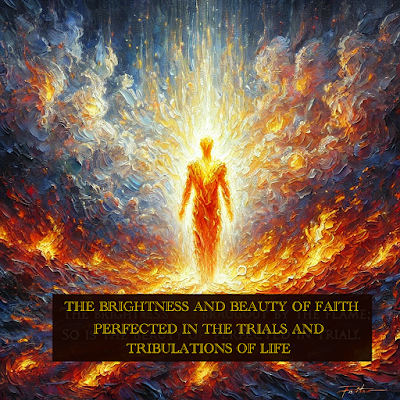Living Hope, Eternal Inheritance
Faith Refined, Salvation Revealed
Rejoicing in Trials
From Grace to Glory
Peter’s first letter (1 Peter 1:1-12) begins with an exuberant celebration of God’s mercy and the profound blessings given to His people. These verses provide a rich tapestry of encouragement, weaving together themes of hope, inheritance, faith, and salvation—all grounded in God’s eternal plan and His love for us in Christ.
1. A Living Hope (1 Peter 1:3-5)
“Praise be to the God and Father of our Lord Jesus Christ! In his great mercy he has given us new birth into a living hope through the resurrection of Jesus Christ from the dead” (1 Peter 1:3, NIV).
Peter introduces us to the cornerstone of the Christian life: a living hope. This is not a fleeting or uncertain expectation, but a confident, vibrant hope grounded in the resurrection of Christ.
C.S. Lewis captures this beautifully: “Hope is one of the theological virtues. It means…a continual looking forward to the eternal world.” This hope is alive because Jesus is alive.
Matthew Henry reminds us, “The new birth is the first blessing of God’s grace to sinners. With it comes a lively hope that looks beyond this world to the eternal inheritance.” This hope is not passive but dynamic, sustaining us as we await the fullness of our salvation.
2. An Imperishable Inheritance (1 Peter 1:4-5)
“This inheritance is kept in heaven for you, who through faith are shielded by God’s power until the coming of the salvation that is ready to be revealed in the last time” (1 Peter 1:4-5, NIV).
Our inheritance in Christ is eternal, untouched by decay or corruption. Unlike the fragile treasures of this world, this inheritance is imperishable, undefiled, and unfading.
Timothy Keller writes, “If you set your hope on anything in this world—career, relationships, possessions—they will eventually fade. But the hope we have in Christ is everlasting and unshakable.”
Eugene Peterson likens this inheritance to a treasure map, leading us through trials and triumphs toward the ultimate prize of eternity with God.
3. Trials That Refine Faith (1 Peter 1:6-7)
“In all this you greatly rejoice, though now for a little while you may have had to suffer grief in all kinds of trials. These have come so that the proven genuineness of your faith…may result in praise, glory and honor when Jesus Christ is revealed” (1 Peter 1:6-7, NIV).
Peter acknowledges the reality of suffering but reframes it: trials are not meaningless; they refine our faith, much like fire refines gold.
Charles Spurgeon offers wisdom: “Trials are the winds that root the tree of our faith deeper into Christ.” The challenges we face reveal the authenticity of our trust in God and prepare us for future glory.
Alexander Maclaren adds, “The brightness of the gold is brought out by the flame; so is the beauty of faith perfected in trial.”
4. Joy Unspeakable (1 Peter 1:8-9)
“Though you have not seen him, you love him; and even though you do not see him now, you believe in him and are filled with an inexpressible and glorious joy” (1 Peter 1:8, NIV).
This joy is not rooted in circumstances but in the unchanging character of God and the certainty of His promises. It is a foretaste of the eternal joy believers will experience when we see Christ face to face.
Rick Warren calls this “purpose-driven joy,” sustained by the promises of God rather than fleeting emotions.
William Barclay reflects, “The Christian’s joy is independent of circumstances because it is founded on the unchangeable character of God.”
5. Salvation Revealed (1 Peter 1:10-12)
“Concerning this salvation, the prophets, who spoke of the grace that was to come to you, searched intently and with the greatest care” (1 Peter 1:10, NIV).
Peter marvels at the mystery of salvation, which was foretold by the prophets and fulfilled in Christ. This salvation, which angels long to understand, is now revealed to us—a profound privilege.
N.T. Wright emphasizes, “The story of salvation is the thread that ties history together, showing God’s faithfulness across the ages.”
Martin Lloyd-Jones reminds us, “We are the most privileged people, living in the age of fulfillment, seeing what the prophets and angels desired to see.” This knowledge calls us to gratitude, purpose, and a life of sharing the gospel with others.
Prayer
Heavenly Father,
We praise You for the living hope we have in Christ and the imperishable inheritance You have prepared for us. Strengthen our faith through trials, and fill our hearts with joy that transcends circumstances. May we live as grateful recipients of Your salvation, reflecting Your love and grace to the world. Help us to set our hope fully on You and rejoice in Your eternal promises.
In Jesus’ name, Amen.
This blog post reminds readers of the profound blessings God has given through Christ: a living hope, an eternal inheritance, and a faith refined by trials. It calls believers to rejoice in these truths and live with gratitude, purpose, and joy.






